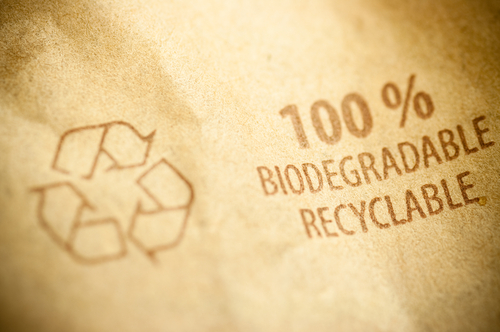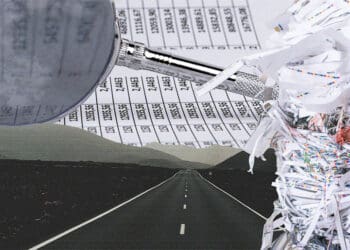Armed with its revised Green Guides, the Federal Trade Commission (FTC) continues to police what it sees as false and misleading environmental claims. In October, the agency announced six enforcement actions in response to marketing of plastic bags, golf tees, storage containers and the like as “biodegradable.” Civil penalties ran as high as $450,000.
ECM Biofilms’ MasterBatch Pellets plastic additive was central to three of the enforcement actions. As the FTC noted in a press release, ECM Biofilms had touted MasterBatch Pellets as biodegradable and had even handed out its own “certificates of biodegradability” in an attempt to add some gravitas to the claim. But according to regulators, “these purportedly biodegradable plastics do not in fact biodegrade within a reasonably short period of time after disposal in a landfill … Moreover, the complaint alleges that ECM has no substantiation to support its claims that its additive makes plastic biodegradable.”
This alleged lack of substantiation helped get ECM customers such as American Plastic Manufacturing, which makes plastic bags, and CHAMP, which makes plastic golf tees, in hot water with regulators. Having added MasterBatch Pellets to their own products, these ECM customers made false and misleading claims when they subsequently marketed those products as biodegradable, the FTC asserted. “The complaint charges ECM with providing its customers and independent distributors … with the means to deceive consumers,” the agency noted.
Regulators also went after Clear Choice Housewares for selling so-called biodegradable storage containers and sued Carnie Cap for allegedly marketing plastic rebar covers as “100 percent biodegradable.” Finally, the FTC targeted AJM Packaging Corp. for its use of adjectives such as “biodegradable,” “compostable” and “recyclable” to describe products such as paper plates, lunch bags and grocery bags.
Under the Green Guides, biodegradability claims must be “true and supported by competent and reliable scientific evidence.” In particular, the onus is on companies to prove “that the entire plastic product will completely decompose into elements found in nature within one year after customary disposal (defined as disposal in a landfill, incinerator or recycling facility) before making any unqualified [emphasis added] biodegradable claim.” For qualified claims, meanwhile, “the companies must state the time required for complete biodegradation in a landfill or the time to degrade in a disposal environment near where consumers who buy the product live.” Alternatively, the companies may “state the rate and extent of degradation in a landfill or other disposal facility, accompanied by an additional disclosure that the stated rate and extent do not mean that the product will continue to decompose.”
If you think the calculations above must amount to a potentially confusing, complicated and difficult evidentiary process—one that, in the end, could hinge on the discretion and interpretation of regulators in a way that would make any compliance officer cringe—you are not alone. Indeed, based on recent news accounts and anecdotal reports from legal clients, it is clear that when it comes to environmental claims, more companies are following advice Mark Twain once gave to aspiring writers: “If you can catch an adjective, kill it.” They are giving up on the vague terminology that has heretofore been part and parcel of green marketing and, instead, are sticking to a “just-the-facts” approach.
This is a wise move. Companies can use fact-based language to convey positive messages with minimal risk. If Acme Paints has reduced the level of volatile organic compounds for each gallon sold by a specific and irrefutable amount, the company can and should say so. This is a far cry from loudly trumpeting something along the lines of, “We’re always green—no matter what color of paint you choose!” or “Saving the Earth, one eco-friendly gallon at a time!”
Government agencies appear unwilling to adopt hard-and-fast regulations on environmental claims, preferring instead to resort to flexible guidelines that give them lots of discretion on enforcement. This raises the risk level for companies that make broad environmental claims. The risk encompasses not just the embarrassment and expense associated with federal enforcement actions, but also the damages that can accrue from lawsuits filed by any number of ideologues or opportunists. At the state level, in particular, the proliferation of consumer fraud and/or private right-of-action statutes means the prospect of a class-action lawsuit often looms even when government action does not. Fighting frivolous litigation is sometimes necessary, but it is typically cheaper to buy peace than to fight for justice. In the end, the company shells out lots of money for legal bills and takes a hit on its reputation in the marketplace, even if it “wins” the actual case.
Moreover, subjective language is a conundrum unto itself. If the company has installed, say, 10 low-flow toilets at its headquarters, this is an indisputable fact. In the realm of the subjective, however, pleasing all sides is nearly impossible. When Apple and Dell—two of the world’s most politically correct corporations—were waging a legal battle over which company had the “greenest” laptops, the response from some environmentalists was further criticism: “Apple is getting greener, but not green enough,” said one Greenpeace activist quoted in a 2008 Wired article. “The MacBook Air has less toxic PVC plastic and less toxic BFRs, but it could have zero, and that would make Apple an eco-leader.”
Let poets and dreamers use flowery language where they will. When it comes to the product, consumers can draw their own conclusions based on the facts at hand.



 About the Author
Attorney
About the Author
Attorney 










